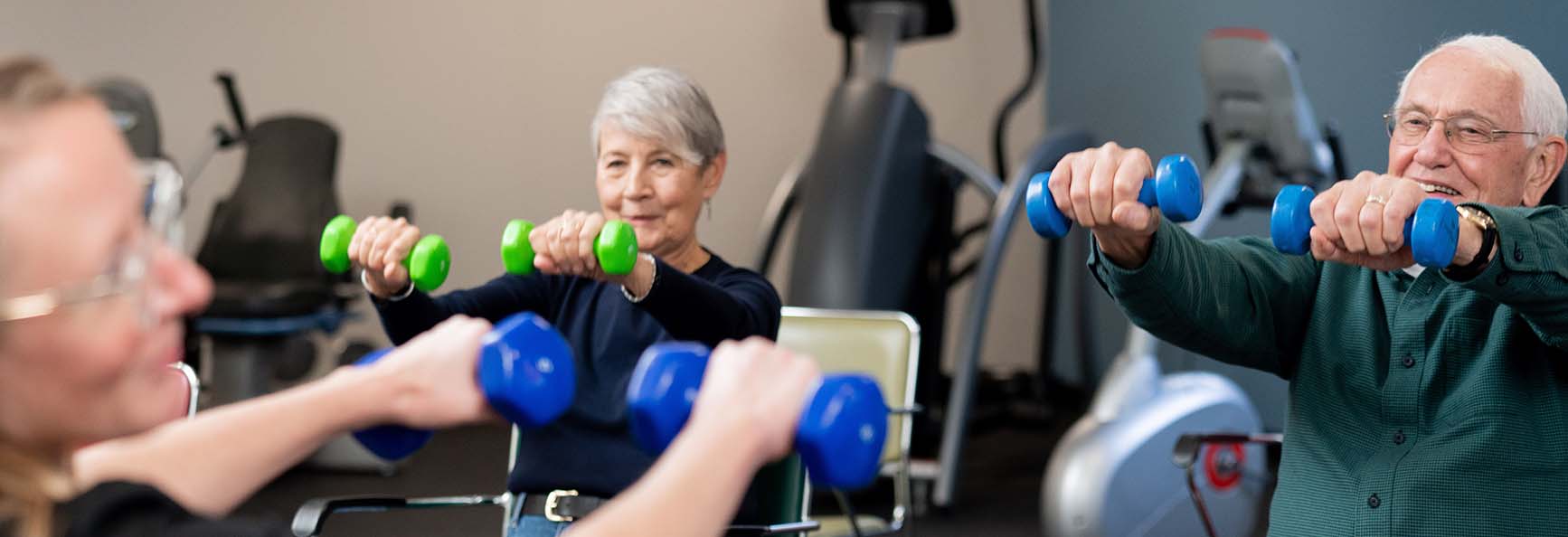April is National Occupational Therapy Month
Thankful for His Son's Future, Al Roker Thanks Occupational Therapy
Every April, we celebrate Occupational Therapy Month to honor this vital profession and the meaningful differences it makes in the lives of our clients.
What is Occupational Therapy?
Your life is made up of occupations - meaningful everyday activities. These occupations can include many roles, such as being a parent, a friend, a spouse, a tennis player, an artist, a cook, or a musician. We generally don't think about our daily occupations until we have trouble doing them. Everyone has occupations - from the toddler whose occupations are play and learning to develop important skills, to the older adult whose occupations are engaging with family and friends and managing his or her home. If you are recovering from an accident or injury, your valued occupations may be disrupted. Occupational therapy incorporates your valued occupations into the rehabilitation process.
Occupational therapy is a science-driven, evidence-based profession that enables people of all ages to participate in daily living or live better with injury, illness, or disability. This is accomplished through designing strategies for everyday living and customizing environments to develop and maximize potential. April is a month about celebrating the holistic approach that OT has brought to healthcare. By taking the full picture into account - a person's psychological, physical, emotional, and social make-up - occupational therapy assists people in:
- Achieving their goals
- Functioning at the highest possible level
- Concentrating on what matters most to them
- Maintaining or rebuilding their independence
- Participating in the everyday activities that they need to do or that simply make life worth living
Who are Occupational Therapy Practitioners?
Occupational therapy practitioners are either occupational therapists or occupational therapy assistants. They are skilled health care professionals who use research and scientific evidence to ensure their interventions are effective. With strong knowledge of a person's psychological, physical, emotional, and social makeup, occupational therapy practitioners can evaluate how your condition (or risk for one) is affecting your body and mind, using a holistic perspective.
Occupational therapy practitioners are experts in helping people perform the occupations they need and want to do every day. Occupational therapy promotes health, well-being, and participation. Occupational therapists and occupational therapy assistants focus on the things you want and need to do in your daily life. Occupational therapy intervention uses everyday life activities (occupations) to promote health, well-being, and your ability to participate in the important activities in your life. This includes any meaningful activity that a person wants to accomplish, including taking care of yourself and your family, working, volunteering, going to school, among many others.
When Would You Need Occupational Therapy
Have you or a family member ever been diagnosed with a new health condition and found yourself asking, "now what?" Maybe you have a child with autism who is having trouble succeeding in school, or an aging parent who wants to remain at home, but you're worried about safety issues, or you are experiencing depression and having trouble doing everyday activities. Occupational therapy can help you answer that "now what?" question. An occupational therapy practitioner will keep the focus on the things you need and want to do—your goals, your activities, your independence. With occupational therapy services you can:
- Achieve goals, such as helping your teenager with a developmental disability gain the skills to transition from high school to independent living as an adult.
- Stay as healthy and productive as possible, while managing a chronic medical condition.
- Maintain or rebuild your independence, such as using assistive devices so you can care for yourself after a stroke.
- Participate in the everyday activities important to you, such as driving, visiting friends, going to church, and other activities that keep you involved with your community.
In short, an occupational therapy practitioner can help you live life to its fullest no matter your health condition, disability, or risk factors.
Why Do You Need Occupational Therapy?
Imagine if an accident, injury, disease, or condition made it difficult for you to participate in your daily activities. A wrist injury means that getting dressed in the morning is painful. Arthritis makes driving challenging. Autism may hinder a child from interacting effectively with classmates. A traumatic brain injury keeps a wounded warrior out of active duty because of difficulties with memory and organizational skills. Or a small change in your activities or the environment could prevent a future condition (such as using ergonomics at work to avoid injury).
Occupational therapy allows people across the lifespan to do the activities they want and need to do. An occupational therapist will evaluate your situation and, with input from you (and perhaps your family, care provider, or friend), develop individualized goals that allow you to resume or pursue your valued occupations. After you develop goals with your occupational therapist, you will work together on a specific intervention plan to help improve or maintain your ability to perform daily activities and reach your goals getting back to your life.
Occupational therapy practitioners can widen their focus to groups or communities too, developing and implementing programs that promote healthy behaviors, or address issues such as older driving, community transitions for returning soldiers, homelessness, troubled youth, mental health, and addictions.
What OT Can Do For You: Aging Safely at Home
The vital importance of the profession aside, April is also about celebrating the miraculous achievements of our clients, the small steps they take to achieve the things they want and need to do. So let's celebrate and promote the importance of occupational therapy and pay a tribute to the superheroes who help people get back on their feet! This year's theme is "Occupational Therapy: Inspiring Hope, Changing Lives." Consider … how are you inspiring hope and changing lives?


